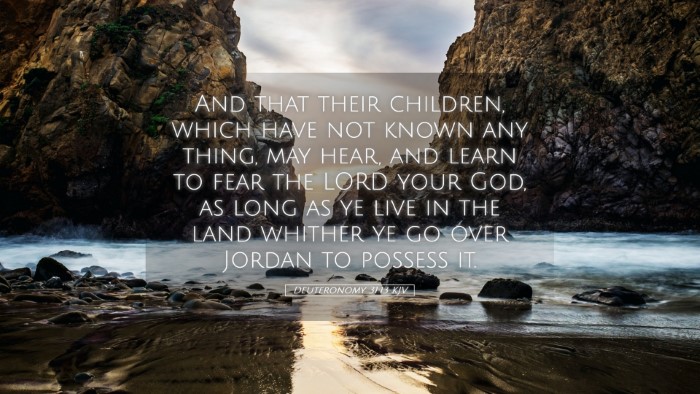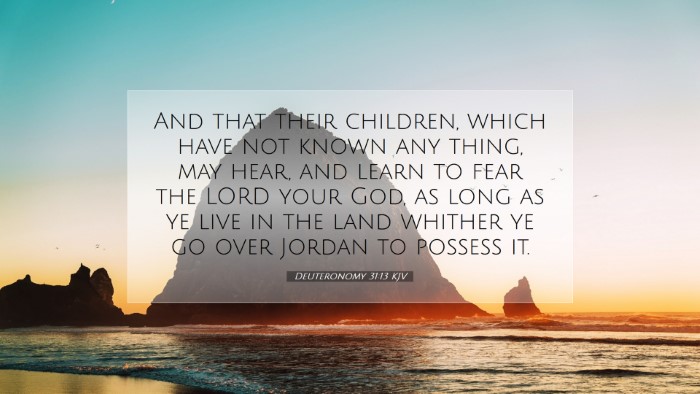Commentary on Deuteronomy 31:13
Scripture Reference: Deuteronomy 31:13 - "And that their children, which have not known any thing, may hear, and learn to fear the Lord your God, as long as ye live in the land whither ye go over Jordan to possess it."
Introduction
This verse is a part of the final exhortations given by Moses to the children of Israel as they prepare to enter the Promised Land. In this context, the emphasis is on the necessity for the younger generation, who have not experienced the previous hardships and lessons of faith, to learn to fear the Lord. This commentary will explore the themes and insights gleaned from public domain sources, such as the works of Matthew Henry, Albert Barnes, and Adam Clarke.
The Significance of Teaching the Next Generation
Matthew Henry emphasizes the importance of instilling a reverent fear of God in the hearts of the youth. He notes that the fear of God is foundational in developing a faithful and obedient life. The act of teaching is not merely imparting knowledge but cultivating a deep, personal understanding of God's character and His expectations.
Albert Barnes further elucidates this concept by recognizing that children represent the future of the covenant community. By understanding who God is and what He has done, they become partakers of the faith of their forefathers. Barnes emphasizes that the historical understanding of God's providence and deliverance serves to strengthen their resolve in future trials.
Adam Clarke provides additional insights into the role of tradition and communal memory in aiding the younger generation to recognize God's continual presence in their lives. The repeated reminders of God's actions throughout history serve as a foundation upon which faith can be built.
The Theme of Fear and Reverence
The term "fear the Lord" holds significant theological weight. Matthew Henry reminds us that this fear is not one of terror but rather a profound awe and respect for the Almighty God. It is a fear that leads to obedience and aligns one's life according to God's will.
Albert Barnes highlights that this fear should lead to a sincere worship and a life characterized by reverence towards God's laws and commandments. Understanding the gravity of God’s nature encourages adherence to His teachings, both in personal conduct and communal living.
Adam Clarke further expounds on the transformative power of learning to fear the Lord. He notes that this fear brings about a change in behavior, motivating believers to avoid sin and seek righteousness. The acknowledgment of God’s sovereignty in their lives shapes their responses to challenges and acts as a guide for moral living.
Continuing Legacy of God's Teachings
The call to teach the younger generation is also a reminder of the covenantal nature of God's relationship with His people. Matthew Henry describes this as a relationship that transcends generations, where each generation bears the responsibility to ensure that faith is passed down. Each individual is a custodian of God's word and tradition.
Albert Barnes points out that the act of teaching children serves both to preserve the faith within the community and to strengthen its future. It allows for a rich fabric of spiritual heritage that can withstand the trials of time and cultural shifts.
Adam Clarke also discusses the aspect of communal memory, suggesting that collective recollection of God’s works and His dealings with Israel should permeate family structures. Through storytelling and shared experiences, the essence of fearing the Lord is cultivated within familial and spiritual communities.
Practical Applications for Today's Congregation
The implications of Deuteronomy 31:13 resonate powerfully within modern church settings. Matthew Henry encourages leaders and teachers to take their roles seriously, recognizing that they are shaping the faith of future generations. There is a call to create environments where young believers can witness the fear of the Lord lived out practically.
Albert Barnes urges the church to equip parents and guardians in educating their children about the fear and love of God. This education extends beyond sermons; it encompasses all aspects of communal life, encouraging vibrant discussions centered on faith.
Adam Clarke emphasizes the necessity of model behavior. Those tasked with guiding the younger generation must demonstrate a life marked by faithfulness and commitment to God. The teaching is most effective when paired with authentic living.
Conclusion
Deuteronomy 31:13 serves as a poignant reminder of the vital importance of teaching the coming generations about the Lord. It underscores our responsibility to preserve and pass down the knowledge, reverence, and fear of God, fostering spiritual growth and resilience in the face of adversity.
This commentary, drawing from the insights of esteemed biblical scholars, reinforces the tenet that teaching the younger generation is not a mere suggestion but a biblical mandate. As we reflect upon this scripture, let us be driven to cultivate a deep-rooted fear of the Lord that transcends generations, ensuring the vitality of our faith and the glory of God among His people.


